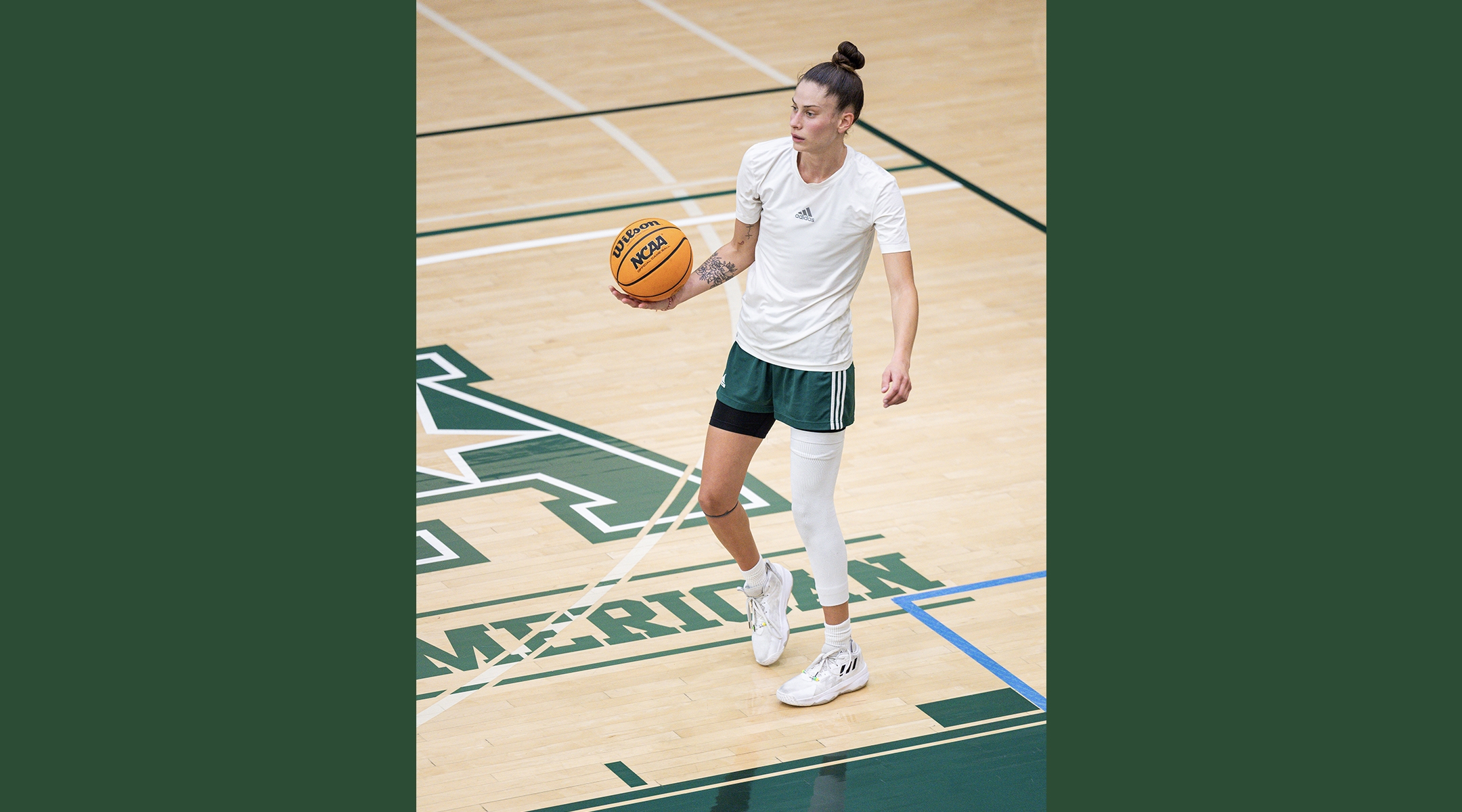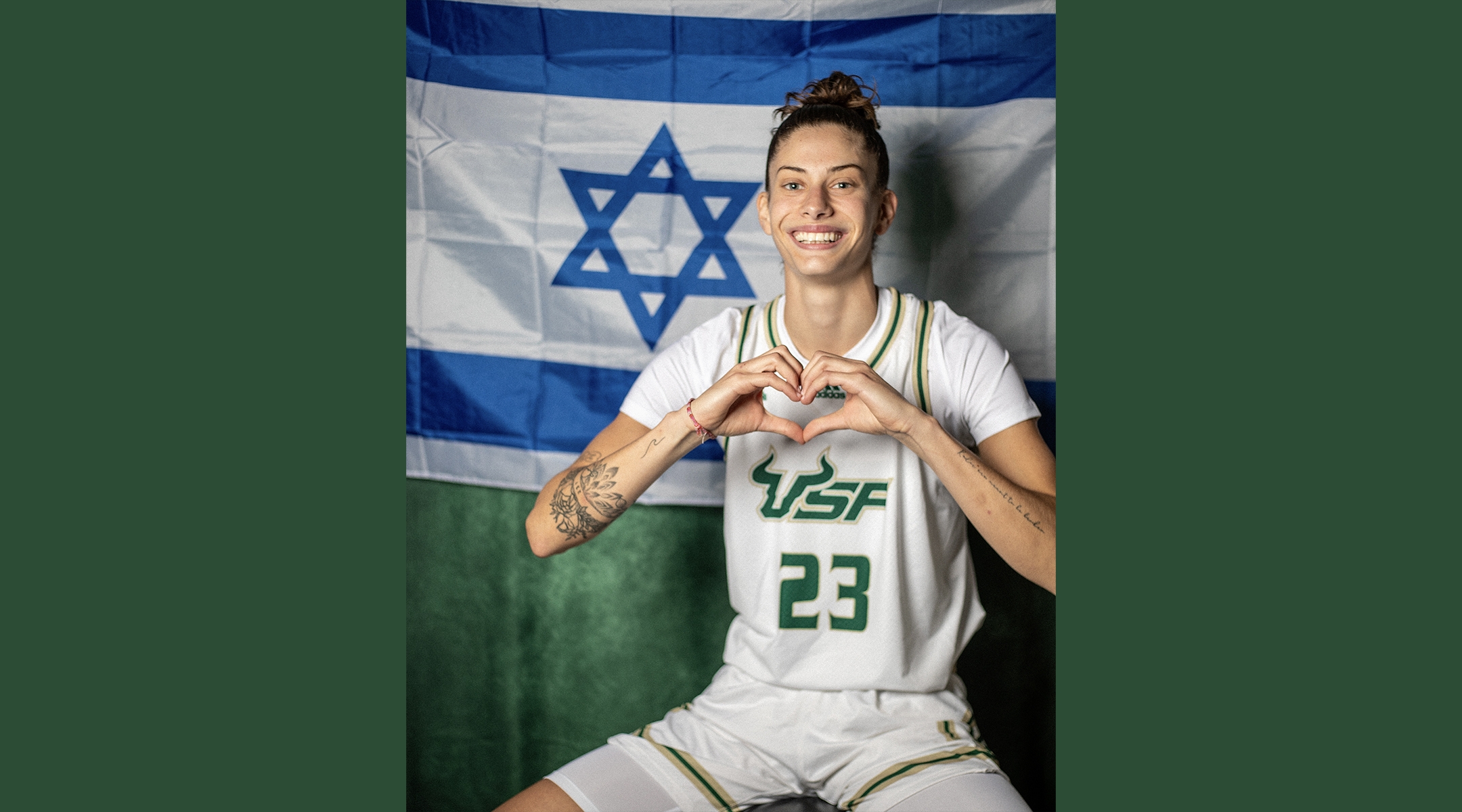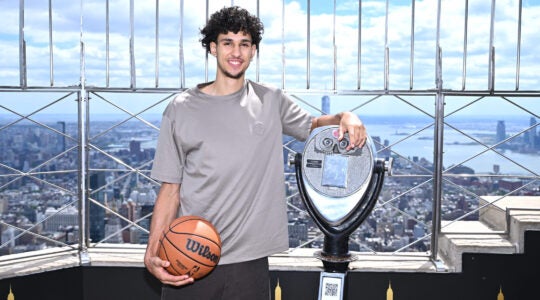(JTA) — Romi Levy glides towards the basket, her sole focus on finishing at the net in the University of South Florida’s practice facility. Moments later, during a break in practice, she checks her phone, hoping not to see any alerts about rocket alarms in her hometown of Herzliya, Israel.
More than 6,000 miles from home at a U.S. university, Levy always thought about Israel often. But things changed on Oct. 7, when some of her high school friends were killed during Hamas’ terror attack on the Re’im music festival. Her cousin, one year younger and like “a little brother,” is on the front lines of the war.
“Trying to stay on top of school and basketball and also knowing everything going on at home was hardest the first week, and it still is hard,” Levy told the Jewish Telegraphic Agency. “I’m just trying to do my best and make sure that everybody at home is OK and try to be there and support them.”
Basketball is an escape. Levy’s time with the team, about six hours per day at the team’s practice facility, gets her away from watching the news “nonstop.”
“I just love basketball so much that when I get on the court I just have fun,” Levy said. “I know that if something were to happen my phone is right there, so I don’t need to think about it when I play basketball.”
She was already looking to turn her college career around on the court this year. This past March, after an injury-plagued three years at Auburn University, Levy put her name in the NCAA transfer portal. More than 40 Division I women’s college basketball programs reached out, illustrating the 6-foot-3 wing player’s potential.
“New life, New team, New position. Starting it all over!” she captioned an Instagram post after transferring to USF.
Born and raised Jewish, Levy is a third-generation standout Israeli athlete. Her grandmother, Tamara Metal Schumacher, was the first female Israeli Olympian, competing in the 1952 Games in the high jump and long jump. She also played for the country’s national basketball team, as did her mother. Levy’s “23” tattoo on her arm honors her grandmother’s Olympic number.
Levy is also a dual Israel-American citizen. Her father, Alon, a former professional soccer player and Ironman triathlete, lived in Los Angeles for a decade and became an American citizen. He and Romi lived in Boca Raton, Florida, during her freshman year of high school, where she attended Olympic Heights Community High School. They moved back to Israel at the end of that school year.
Between graduating from Hof Hasharon High School and beginning college, Levy completed Israel’s mandatory two-year national service requirement. During her service, spent at her parents’ rehabilitation center working with Israel Defense Force veterans, Levy also represented the Israeli national team at the U18 Women’s European Championships, leading the team to a bronze medal.
She enrolled at Auburn in 2020 on the recommendation of Israeli three-time Olympic swimmer Yoav Bruck, a 1994 Auburn graduate and friend of her parents. Levy posted her best season to date as a freshman, averaging 5.4 points, 3.9 rebounds, 1.5 assists and 1.4 steals per game en route to SEC All-Freshman Team honors.
She then missed her sophomore season due to an ACL tear suffered in her left knee and injured her meniscus in both knees during a preseason practice. She made a strong return, posting 6.7 points and 4.2 rebounds per game in 23 appearances for Auburn last season, but Levy played through pain. Unable to straighten her leg all the way, it swelled to the point where she needed it drained and took steroid shots. With Auburn out of any postseason play, Levy sought an MRI. She again underwent season-ending knee surgery in February.
She called Auburn — where she celebrated Jewish holidays with men’s basketball coach Bruce Pearl and his family — “a great place for school, but for basketball it wasn’t a good fit for me.” USF boasts a stronger women’s basketball program: While Auburn finished a solid No. 81 out of 361 teams in last year’s NCAA NET Rankings, USF finished No. 39.
Levy likes to play far from the basket on offense. A physical lefty with a deft shooting touch, she flashed 3-point range during her time at Auburn but mainly played with her back to the basket in the post. At USF, she’s transitioning back to her natural position on the wing.
Carsen McFadden, a current member of the Auburn women’s basketball team in Levy’s recruiting class, told JTA she appreciated learning about Jewish and Israeli culture from Levy — such as the fact that Hebrew is written from right to left. McFadden, who called Levy her “best friend,” acknowledged Levy’s efforts to stay positive during a trying time at Auburn, always there to lend a listening ear and a hug.
Outside of basketball, Levy felt comfortable with USF because of its large international student population — more than 50% of the undergraduate population in the fall of 2021, according to the school. At USF, she has also found a larger Jewish community, attending events at the school’s Hillel center and Chabad house and in the greater Tampa community, as her busy schedule permits. She does her best to celebrate all of the Jewish holidays stateside but longs for extended family’s Friday night Shabbat dinners.

Levy struggled with injury issues at Auburn and is looking for a clean start at the University of South Florida. (South Florida Athletics)
“We’d do the Kiddush and all that,” Levy said. “Seeing everyone together is something I miss. Friday nights aren’t as special here as they are in Israel.”
Levy’s parents still live in Israel, roughly an hour by car from the Gaza Strip. Alon Levy traveled from Israel to Tampa this week to visit his daughter and attend her first game at USF, a 76-61 win over UT Arlington in which Romi scored 10 points across 21 minutes of action. Alon said he and his wife Liat communicate with Romi and their older daughter, Sean, a New York City-based model, daily.
“I can’t explain what we are feeling, but we are in shock, all of Israel is for what happened,” Alon said. “I think almost everybody in Israel has someone that something happened to. There are no words to explain it.”
He told Romi not to look at the news too much and try to focus on her new beginnings in Florida.
“I’m coming now, also, to give her a hug and see how she feels,” he said. “From a distance, you never know exactly how your children are feeling. They always say they are OK. But she’s OK. She’s OK.”
JTA has documented Jewish history in real-time for over a century. Keep our journalism strong by joining us in supporting independent, award-winning reporting.






